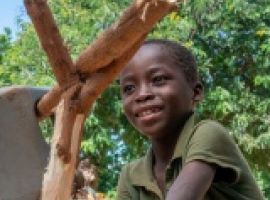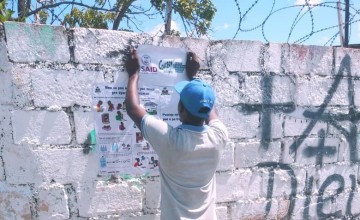
Read our 2022 annual report

Knowledge Hub
Concern responding to cholera outbreak in Haiti

Concern Worldwide is responding to a cholera outbreak in Haiti, where there are currently 200 confirmed cases and 40 confirmed deaths*.
The Irish humanitarian organisation is responding by supporting health centres, and cholera treatment centres with materials and resources to disinfect contaminated areas. It is providing hand washing points in public spaces and running mass prevention awareness campaigns using community radio stations, mobile phone operators and global social media platforms.
“Haiti is contending with multiple concurrent shocks. Economic deprivation, social and political instability, and violent conflict negatively impacts the everyday lives of people living in the metropolitan area of the capital, Port-au-Prince. The cholera outbreak adding to this myriad of issues, has aggravated the existing humanitarian crisis in Haiti, causing further stress to people’s lives. Prevention and the knowledge on how to stop cholera spreading is essential to keeping the numbers of cases down,” said Kwanli Kladstrup, Country Director with Concern Worldwide in Haiti.
There are a further 1,752* suspected cases of cholera; a bacterial illness causing severe diarrhoea, vomiting and dehydration, which can be contracted through contaminated food or water.
Haiti has previously battled a cholera epidemic which hit the Caribbean nation shortly after the devastating earthquake there in 2010. More than 10,000 Haitians died from cholera between 2010 and 2018, before the country was declared free of the illness.
Haiti is experiencing an unprecedented socio-economic and political crisis with continued rising costs of basic products. Inflation is at 30%, threatening the livelihoods of already vulnerable people. Some 48% of the population (4.7 million people) are facing acute food insecurity, meaning they are unable to consume adequate food, putting their lives or livelihoods in immediate danger, and requiring urgent food assistance.
Gang violence has spread throughout the country with the main fuel terminal in the capital Port-au-Prince blockaded. This has halted most transport, in turn creating shortages of basic goods, including clean water.
Hospitals and health centres have had to close or reduce procedures due to lack of fuel to power generators which are essential to Haiti’s unreliable power grid.
“It’s vital that people have access to clean water, particularly given the cholera outbreak. However, the continued blockades and fuel shortages have limited people’s access to clean water these past few weeks as water treatment services and deliveries have been suspended,” said Ms. Kladstrup.
“Within this context, we are continually having to adapt our efforts in delivering humanitarian assistance. Through our network of community resources and dedicated staff, we are able to reach those most in need and to continue supporting local structures for community based cholera prevention and response.”
At least 1.5 million people have been directly impacted by the gang violence, with gender-based violence, including rape, used as a weapon of conflict in disrupting daily lives.
“This level and cycle of violence is causing a great level of stress to young girls, boys, men and women. For many young girls and boys, they feel a sense of powerlessness. For women and men, there is the impression that the violent leadership model takes precedence and limits the influence of other leaders,” added Ms Kladstrup.
“During times of heightened conflict, people are prevented from moving from one neighbourhood to another, to either engage in daily activities or to get food, all which contributes to making them more vulnerable to gender based violence.”
Concern is also responding to cholera outbreaks in other countries it works in such as Malawi, Syria and Somalia.
*As of 20th October 2022, Haiti Ministry of Health and Population
For further information please contact Eilis Staunton, Media Relations officer with Concern Worldwide on 085 872 0720 or eilis.staunton@concern.net
Other ways to help
Corporate support
Is your company interested in working together for a common cause?
Fundraise for Concern
From mountain trekking to marathon running, cake sales to table quizzes, there are lots of ways you can support our work.
Buy a gift
With an extensive range of alternative gifts, we have something to suit everybody.
Leave a gift in your will
Leave the world a better place with a life-changing legacy.
Volunteer with Concern
The lots of ways to get involved with our work as a volunteer
School fundraising
Without the generous support from schools, we wouldn't be able to do the work that we do.

